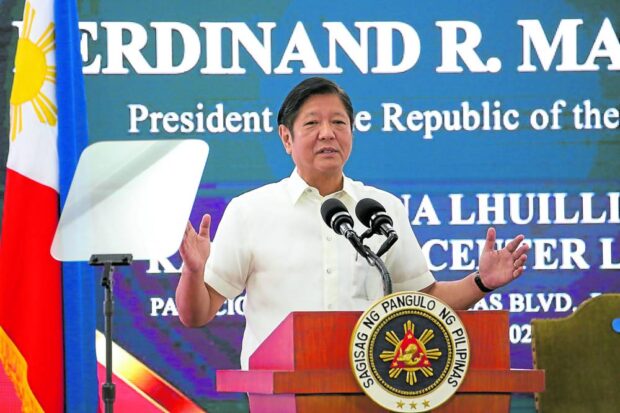
President Ferdinand R. Marcos Jr. delivers his speech during the launching of Cebuana Lhuillier’s Kanegosyo Center at the Palacio de Memoria in Parañaque City on Thursday, June 29, 2023.
—NIÑO JESUS ORBETA
A number of local business groups have rated President Bongbong Marcos’ first year in office as mostly positive, expressing varying degrees of optimism going forward even as several economic issues remain unsettled.
The Philippine Chamber of Commerce and Industry (PCCI), the biggest business organization in the country, on Thursday highlighted the President’s actions in promoting the country overseas as an ideal investment destination.
“I think he has a very good rating on that aspect,” PCCI president George Barcelon said in an interview with ABS-CBN News Channel.
According to the Presidential Communications Office (PCO), the President’s foreign trips have generated P3.48 trillion in investment pledges.
Last February, the PCO listed these commitments from seven of nine foreign trips that Mr. Marcos made since assuming the presidency in June 2022, topped by China with P1.34 trillion. This was followed by Japan with P719 billion; Indonesia, P468.96 billion; Singapore, P361.67 billion; Thailand, P255.53 billion; United States, P212.74 billion, and Belgium, P121.68 billion.
Ebb Hinchliffe, executive director of the American Chamber of Commerce of the Philippines, told the Inquirer that they considered the Marcos administration’s first year as “very successful.”
“There are challenges ahead with inflation, education, nutrition and corruption. But from the US business community’s perspective, the time for the Philippines to shine has arrived,” said Hinchliffe.
“For now, most of the stars are aligned. Marcos’ outreach to [Washington] and the response of the US to his administration has been a very pleasant surprise,” he added.
Agriculture, energy, airports
Analysts have noted that there has been a pivot in the Philippines’ foreign policy since Mr. Marcos assumed office, with the country restoring ties with the United States but “not closing its doors” to China.
Meanwhile, the Foreign Buyers Association of the Philippines (Fobap), an association of traders and exporters of furniture, garments and handicraft, characterized the President’s first year as being “in the right place.”
Moving forward, PCCI’s Barcelon said “the agriculture sector, definitely, has to be focused on, and also the power [sector].”
“To be honest, one of the low-hanging fruits is the tourism sector. So, the running of the airport and everything must be strengthened,” he added.
For Fobap, “we look forward to the swift execution of the Philippine Export Development Plan, [which is] the key to understanding the degree of urgency and imperatives of the challenges in the industry,” its president, Robert Young, said in a message sent to the Inquirer.
Young also expressed optimism that the key appointments and directives by the President this year would lead to substantive results in the coming years.
‘Incomplete’ grade
Mr. Marcos, as concurrent secretary of the Department of Agriculture, gave himself an “incomplete” grade in his first year, saying the administration still has many things to do.
Speaking to reporters in Parañaque City on Thursday, the President said there was still much to accomplish.
“Well, you know the delivering of promises is a work in progress. It’s not something that you say, ‘It’s done. I finished it,’” he said. “This is an ongoing process.”
Aries Arugay, chair of the Political Science Department of the University of the Philippines, gave Mr. Marcos an incomplete grade in his first year in office as head of the agriculture department.
“I saw a report earlier this morning where one of the economists said the grade that I will give the President for agriculture is incomplete. I agree with him. We are not yet done. We still have much to do. There are many, many things that we still need to do,” the President said.
“We have to undo 30, 35, almost 40 years of neglect when it comes to the agricultural sector,” he added.
During the campaign period, Mr. Marcos promised to bring down the price of rice to P20 a kilo, but the lowest price of rice is currently at P25 in Kadiwa stores.
He said the agricultural sector still occupies “the most fundamental part of our economy.”
Inflation
The President also said the government continues to fight inflation.
“I think we have seen many of the changes. We are beginning to see the systemic changes that are going to be part of the new bureaucracy,” he said.
“But there’s still a long way to go. We continue to work on the economy to make sure that our basics, our macroeconomic basics are in place,” he added.
In his first year in office, the country recorded a 14-year high inflation rate of 8.7 percent in January this year.
“So, you know, it’s never enough. It’s never enough. Whatever it is that we have managed to do, there is still a great deal more to do. We have a lot of work still to do and we have to work smart and we have to work well and we have to be very conscious,” he said.
READ: Marcos, VP Duterte get high approval ratings in latest Pulse Asia survey